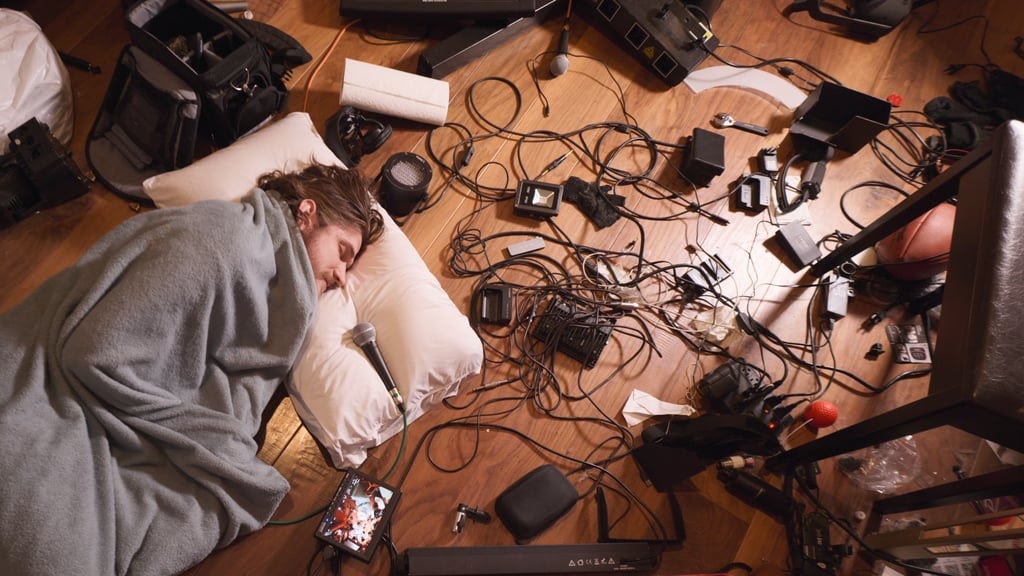Should We Be Joking At a Time Like This?

Image courtesy of Netflix
By Margaret Adams
After a five-year hiatus from comedy, Bo Burnham has returned to the Internet in an unprecedented way – through a “comedy” special that he wrote, produced, and directed himself over the past year and a half while in quarantine.
Although advertised as a comedy special, comedy was not the focal point of the hour-long show Bo-Burnham: Inside. Inside documents Burnham’s own decline in mental health during quarantine and explores many social issues that have been illuminated while quarantining, like racial inequality and toxic internet culture, through songs.
The director’s Netflix special does, however, include many comedy songs; “White Woman’s Instagram” dissects and satirizes the “basic” white woman’s Instagram account grid, poking fun at the trend to look ‘aesthetic’ on social media.
“Problematic” is another comedic song that explores cancel culture through Burnham’s perspective to a funky 80s workout groove: “Father, please forgive me for I did not realize what I did/Or that I’d live to regret it/ Times are changing and I’m getting old/ Are you gonna hold me accountable?”
There are more critical songs that examine serious issues through a comedic lens. “How the World Works” takes the form of an educational children’s song that begins by sincerely and succinctly explaining how nature works together to produce life as we know it. But the song takes a jarring turn when Burnham uses a sock puppet to convey how the world really works: “The simple narrative taught in every history class/Is demonstrably false and pedagogically classist/Don’t you know? The world is built with blood! And genocide! And exploitation!”
That being said, the most memorable songs are Burnham’s anguished ballads that explore his more personal feelings about modern life in light of the COVID-19 pandemic.
“Funny Feeling” is an acoustic tune that lists a number of post-modern things and situations that present the singer with the sinking feeling that the world is really ending: “Full agoraphobic, losing focus, cover blown/A book on getting better hand delivered by a drone/Total disassociation, fully out your mind/ Googling “derealization,” hating what you find/That unapparent summer air in early fall/The quiet comprehending of the ending of it all.”
One of the most outstanding aspects of this special by Burnham is the bleeding of the line between authenticity and performance. This concept is not a new one to infiltrate his comedy routines, as he has had jokes in past stand-up that fool the audience into thinking that something is an authentic reaction or mistake, when it was actually part of the performance.
Throughout the special, Burnham does check-ins with the audience, telling them how far he is currently in with the special, how far he has to go, and feelings about finishing it, making this authentic moment a part of the whole performance. When Burnham talks to the audience like this, he is usually facing a mirror, with a camera pointing at the mirror.
In fact, the camera is almost a character within itself. Burnham has a tendency to look for audience approval in his work, and intertwines that sentiment in his comedy. With the COVID-19 pandemic keeping the world quarantined for a year, cameras have been the way to connect with one another, whether it be to loved ones or work. Obviously, this has been a useful resource, but cameras have also kept us indefinitely connected to work, friends, and the outside world. There is no inside to escape from the outside, so there is no escape from an audience.
This unprecedented era of the outside world coming inside and the anxieties that come along with it is constant throughout the special, especially in his song, “Look Who’s Inside Again.”
“Well, well, look who’s inside again/Went out to look for a reason to hide again/Well, well, buddy you’ve found it/Now come out with your hands up we’ve got you surrounded,” Burnham sings.
With the special getting much commercial success, one of the many praises it has received is how self-aware it is. I don’t necessarily agree with this sentiment.
In one of the first songs of the special, “Comedy,” Burnham satrically acknowledges that another white man in comedy is not what will help people get through an unprecedented and depressing time like this: “I’m a special kind of white guy/I’ve self-reflected and I want to be an agent of change/ So I am gonna use my privilege for the good.”
In reality, he is another white guy making another comedy special while many black women continue to struggle getting opportunities like this. Oscar-winner Mo’Nique called Netflix out for offering her considerably less for a stand-up special than her male counterparts like Dave Chappelle and Chris Rock in 2018.
The special continues to do for Burnham what he says in irony: it pays him and puts him as the center of attention. Not to say that the world would be a better place if he did not release the special, but the special is not as self-aware as it thinks it is.
Overall, Bo Burnham explores questions like, “What does comedy mean in a world that’s falling apart?” and, “How do we continue to live under an audience’s constant and watchful eye?” and, “How do we cope with the impending end?”
Maybe the answers lie in Burnham’s one-hour comedy special, but I prefer to keep looking.





